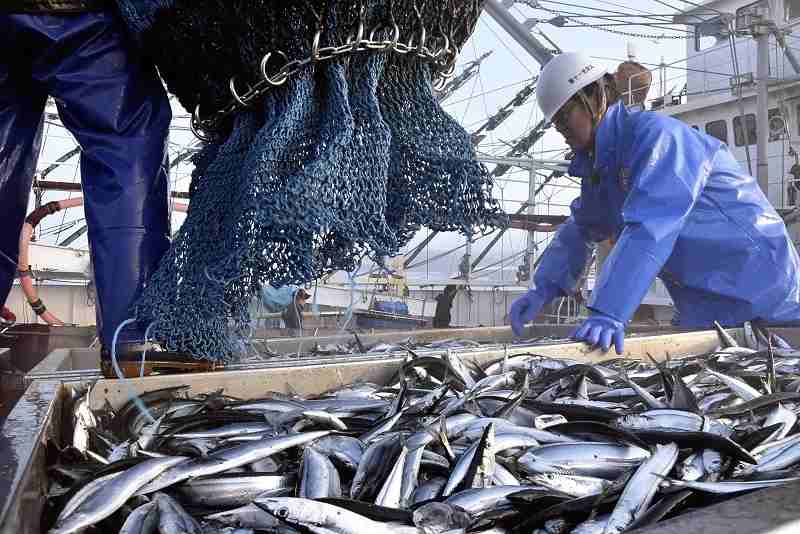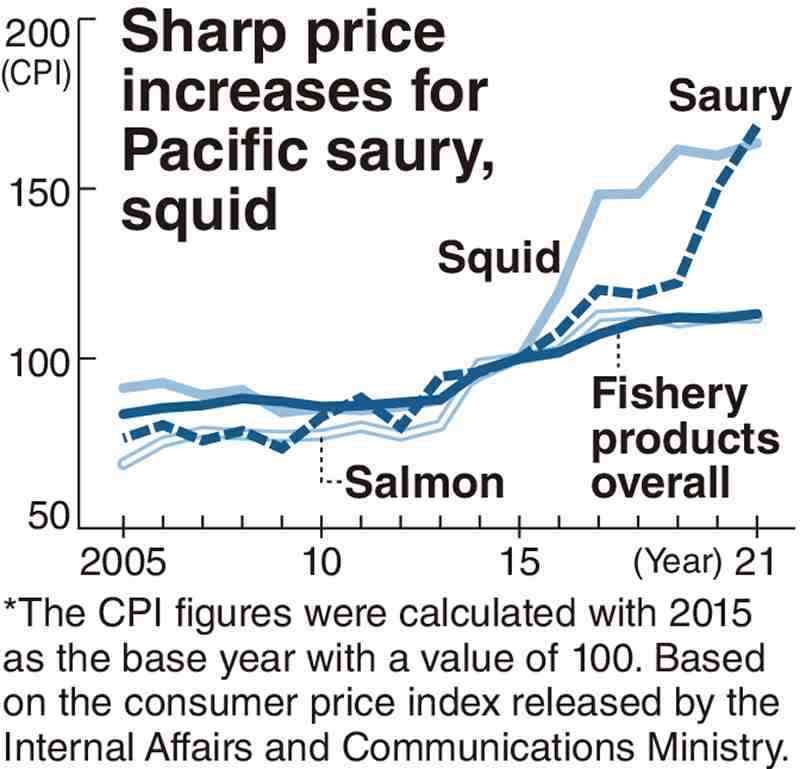
Crew members land Pacific saury at Hanasaki Port in Nemuro, Hokkaido, on the morning of Sept. 29.
21:00 JST, October 29, 2022

The plight of fishermen in northern Japan is increasingly serious as they are buffeted by the deteriorating relations between Japan and Russia due to the latter’s invasion of Ukraine, soaring fuel oil prices and poor catches of major species, including Pacific saury.
Slender saury
Hanasaki Port in Nemuro, Hokkaido, boasts Japan’s largest catch of Pacific saury for 12 consecutive years. Thirteen boats large and small began landing saury at around 2:30 a.m. on Sept. 29, a process that lasted for nearly four hours. But the fish were noticeably smaller than usual, measuring one to two centimeters shorter than those caught in normal years.
“The schools of fish are small again this year. Even when we catch them, they’re just slender ones that would’ve been used for processing 10 years ago,” said the chief fisherman of a large vessel.
In 2010, saury landings at Hanasaki Port exceeded 32,000 tons at the end of September. In recent years, however, the catch has hit record lows. This year it was less than 3,000 tons at the end of September.
“Even in the latter half of October, there have been no signs of a turnaround,” said an official at the Japan Fisheries Information Service Center in Tokyo.
No permits
Worsening bilateral relations between Japan and Russia have also cast a shadow.
“We don’t have a permit to fish in waters 200 nautical miles off the coast of Russia this year, so even if there are fish in the high seas nearby, we can’t go near them. It would be a disaster if we were to be caught [by Russia].”
Every year, the national saury fishery association applies to Russian authorities for permits to operate in that country’s waters, which are then handed over to about 100 Japanese vessels. This year, however, they were unable to send the relevant documents to Russia because international courier services to Vladivostok are not available due to economic sanctions imposed on Russia.
“We want to break the deadlock to secure our precious catch,” said Kohei Oishi, managing director of the association. A similar situation is occurring with squid fishing in the Sea of Japan.
At an emergency meeting held by the National Federation of Fisheries Cooperative Associations in Tokyo on Oct. 13, fishermen appealed to members of the Diet for help, saying: “The current situation is beyond what we can handle on our own. We can’t keep ourselves afloat as things stand now.”
According to the Fisheries Agency, the monthly average price of crude oil had ranged since 2009 between ¥14 per liter in April 2020 and ¥70 per liter in December 2013. However, since March this year, the price has moved between ¥81 and ¥95 per liter, increasing the burden of fuel oil costs on fishermen.
In the aquaculture industry, feed accounts for 70% of production costs, and in August, compound feed prices rose by 20% to 30%. The agency is considering boosting its support to counteract soaring fuel oil and feed prices.
Fish merchant struggles
The impact of the current crisis has spilled over to general households as well.
The Uou fresh fish store in Toshima Ward, Tokyo, has seen the purchase price rise for almost all of the about 200 types of fish that it handles, including salmon and shellfish, starting last year.
“We have no choice but to transfer some of the rising cost to our selling price. We’re a fish dealer selling food to ordinary people, so this is painful for us,” said a 73-year-old proprietor.
A 46-year-old customer said: “Every time I came here, I used to buy two fish. But nowadays, I buy only one more often than before.”
Per capita consumption of fish and shellfish in Japan has continued to decline since it peaked in fiscal 2001, and it has fallen below that of meat since fiscal 2011. The prices of saury and squid, which have long been called “a powerful friend of ordinary people,” have risen sharply in recent years due to poor catches.
Takeshi Hamada, a professor of fisheries policy at Hokkai-Gakuen University, said: “If the capacity to supply fish declines due to the deteriorating financial situation of fishery businesses, it may lead to price hikes and smaller sales areas. This could further encourage people to stop eating fish.
“At this point, significant financial support for fishery businesses is necessary to protect the ‘fish-eating culture’ of this country.”
Top Articles in Business
-

Prudential Life Insurance Plans to Fully Compensate for Damages Caused by Fraudulent Actions Without Waiting for Third-Party Committee Review
-

Narita Airport, Startup in Japan Demonstrate Machine to Compress Clothes for Tourists to Prevent People from Abandoning Suitcases
-

Japan, U.S. Name 3 Inaugural Investment Projects; Reached Agreement After Considerable Difficulty
-

Toyota Motor Group Firm to Sell Clean Energy Greenhouses for Strawberries
-

SoftBank Launches AI Service for Call Centers That Converts Harsh Customer Voices into Softer Voices
JN ACCESS RANKING
-

Japan PM Takaichi’s Cabinet Resigns en Masse
-

Japan Institute to Use Domestic Commercial Optical Lattice Clock to Set Japan Standard Time
-

Israeli Ambassador to Japan Speaks about Japan’s Role in the Reconstruction of Gaza
-

Man Infected with Measles Reportedly Dined at Restaurant in Tokyo Station
-

Videos Plagiarized, Reposted with False Subtitles Claiming ‘Ryukyu Belongs to China’; Anti-China False Information Also Posted in Japan




















